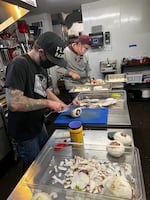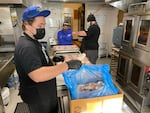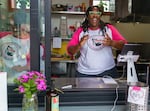
Michael Casper, front, and a volunteer with Milk Crate Kitchen prepare one of the weekly meals they provide to families in the Portland metro area. Like many who started a mutual aid group during the pandemic, Casper worked out of his home but now rents space in a local kitchen as the number of meals to cook has grown.
John Hill
Like many restaurant workers in 2020, Michael Casper found himself with a lot of free time.
A sous chef at the Tualatin Country Club at the time, his hours were cut as the pandemic forced many establishments to temporarily shut down, shift to take-out dining or just close their doors. He had been saving up for a long time for a “once-in-a-lifetime” trip to Southeast Asia that he suddenly had to cancel. He was now at home, not knowing what was next, when some advice popped into his head.
“My grandmother always said, if you don’t know what to do, do what you know,” he said. “I wanted to take on the burden of cooking one meal for a family.”
With that, he posted a note on Instagram telling his friends and followers, “I want to cook for you.”
A few friends responded, so he prepared them meals free of charge. He enjoyed it so much he kept doing it. Word got out and the list of families who reached out for a meal grew. In a few weeks, he went from a dozen requests for a meal to dozens. He’d created what is now Milk Crate Kitchen. Now he has an assistant, Sherielyn Gardner, who helps him run the operation and a group of volunteers who pitch in.
“I’m humbled by the amount of people who want to help,” Casper said. “There is a need for something like this.”
Casper isn’t alone. His Milk Crate Kitchen is one of several nonprofits and group efforts that have sprung up during the pandemic in Portland as part of a larger so-called mutual aid movement, partly fueled by a desire to feed people in need and the stronger sense of urgency to help BIPOC communities in the wake of the killing of George Floyd in Minneapolis.
Groups like Milk Crate, Meals On Us PDX, Our Streets PDX, PDX Free Fridge, Love Your Black Community, Meals 4 Heels and more have stepped up to help feed people in the Portland metro area.
Three of them, including Milk Crate, work out of a shared space in Northeast Portland that is operated by Mark “Goose” Guzman, who runs Meals On Us PDX. Guzman leases kitchen space to Casper and Our Streets PDX — until the latter moves out in the near future for a larger space.
“A lot of love comes out of here,” Guzman said from one side of the building he’s dubbed Para Todos, or in English, For Everyone.

Jackson Walker, left, and Benjamin Fisher, right, prepare some chicken legs on Dec. 3, 2021, to cook in the oven for dinners that Meals On US PDX will later deliver to area shelters. Mickey Leonardini observes from the back of the kitchen.
John Hill / OPB
Like many of the people who have started mutual aid groups, Guzman and others began operating on a much smaller scale out of his home, making meals for first responders as the pandemic began to take hold in the region.
As more organizations stepped forward to do the same, though, the 36-year-old chef decided to pivot, and he began reaching out to shelters. He started first by making breakfasts, which then led to contracts with shelters to provide more meals. Those contracts allowed Guzman to take his mutual aid efforts further. He rented kitchen space in the building he’s in now and hired chefs. Eventually, he needed to rent the other two kitchens, as well as the upstairs rooms.
Those shelters include Do Good Multnomah, All Good Northwest and Greater Good Northwest. Guzman employs 15 people, most of them chefs, to cook and deliver more than 100 breakfasts, 80 or more lunches and more than 600 dinners every day. Guzman said they try to prepare an additional 200 meals a day that they take to free fridges around Portland and outlying areas.
Many of those free fridges can be found around the region because of PDXFreeFridge, another mutual aid operation that is entirely volunteer-run. It helps locate and build enclosures for refrigerators in the metro area that people can stock with packaged food as well as prepared meals, like the ones Meals On Us and others provide.
Dozens of such refrigerators and food pantries can be found in the Portland metro area, including three that are frequently stocked by Love Your Black Community, another mutual aid group, started and run by Dwindell Feeley.
Feeley started his nonprofit in summer 2020, following the killing of George Floyd in Minneapolis.
“I was angry, frustrated and pissed,” Feeley said, but he also wanted to do more than protest. “I wanted to do something specifically for the Black community.”
He started with efforts to collect air filters and masks during the wildfire season in the fall of 2020, and then switched to gathering and distributing school supplies for Black families. Donations came pouring in, partly from a GoFundMe account, but also in the form of electronics, including, cell phones, refurbished iPads and 30 Chromebooks.
Feeley, the son of Haitian immigrants, grew up in New York and moved to Portland two years ago. “I’ve always had this thing about wanting to give back.”
He partnered with PDXFreeFridge to build three fridge enclosures, finding locations in Portland, Beaverton and Hillsboro. He pays a local Black artist to create artwork at each location. He’s hoping to find some business partners, preferably Black-owned, but he won’t turn others away, to house and help maintain fridges.
Volunteers help Feeley keep the current fridges stocked, and he’s also working with members of the Black community to host virtual programs to teach people to cook. He also worked with others to host virtual programs on hair care and styling.
Like Feeley, Nikeisah Newton also wanted to help, but she serves another niche with her mutual aid effort, Meals 4 Heels, a business catering to sex workers and the sex-positive community in Portland.
Unlike many mutual aid operations, Newton’s work predates the pandemic or racial justice protests of 2020. She first got the idea in 2017 when she noticed her girlfriend, an exotic dancer, was dancing to pay her way through school. Newton would cook for her because she didn’t have the time. Other dancers took notice. “They’d ask, ‘What are you eating? Where’d you get that?’”
She and her girlfriend later broke up, and Newton started exploring the idea of creating and delivering meals for other dancers. She started Meals 4 Heels and delivered her first order in January 2019.
Her food is vegan and vegetarian. “It had to be something that could be easy for (sex workers) to digest and could be kept at room temperature for a while. It’s a good way to get their protein, and it’s light and doesn’t sit in their gut.”

Nikeisah Newton talks with customers during the Come Thru BIPOC market at The Redd on May 17, 2021. Newton founded Meals 4 Heels in 2019, a meal delivery service catering to Portland’s sex worker community. Newton has since started serving food from a space at The Redd.
Kristyna Wentz-Graff / OPB
“The response has been more than 1000% positive,” Newton said, adding that sex workers have noted they like having Newton deliver because they feel safer as sometimes drivers from other food delivery services have at times harassed them.
Unfortunately, orders took a steep nosedive when the pandemic hit. Newton still handles a few orders, but she branched out through catering focused on social justice efforts. She’s also busy running a walk-up window at The Redd in Southeast Portland where she operates The Powerhouse Cafe, a restaurant-in-residence program for BIPOC-run food businesses.
Social justice is what motivated Mitchell Asemota and Mikah Takashige to start Our Streets PDX, which recently moved into its own kitchen space in the Patton home near Ockley-Green Middle School in North Portland.
While participating in the protests last summer in Portland, the two of them and some friends started cleaning up graffiti and picking up trash. Asemota said they also couldn’t help but notice scores of houseless people living on the streets.
“We saw a big need for help and support that wasn’t being provided by the city or the state,” Asemota said.
They decided to start cooking meals in their homes and began distributing 250 meals a week in the park blocks downtown along with tarps, blankets, water bottles and other supplies.
Our Streets became a two-pronged effort to “build the streets” and “feed the streets,” continuing to clean up trash and feed people in need. Like Guzman with Meals On Us PDX, Our Streets eventually landed contracts with some of the same area shelters, making 500 vegan and vegetarian meals a day. They also still deliver meals to the park blocks once a week.
Aside from feeding people, Asemota said they’re also still picking up trash around the city, thanks to volunteers who pitch in. They are actively recruiting youths to help, which recently led to a project to plant a garden at Ockley-Green, and they hope to be able to offer youth scholarships down the road.
“We’re just trying to build this up as much as we can,” Asemota said. “We’re trying to put whatever we can into helping the people who are struggling.”
Guzman said that is partly what drives him. Raised in South Chicago in a Mexican-American family with eight brothers and sisters, he knows what it’s like to grow up without a lot of money. “We struggled.”
Helping others who are struggling also has helped him stay clean and sober since giving up alcohol, drugs and cigarettes in November 2019. He likes that he’s able to employ other chefs, who enjoy the same sense of purpose Meals On Us has given him.
“When you’re happy, you do your best work,” Guzman said. “You’re cooking with love and it shows. It shows in the meals.”
Cooking with love is why Milk Crate Kitchen’s Casper doesn’t ask questions of anyone who asks him for a meal. “Sometimes it’s new parents who are struggling with a new baby, single mothers working two jobs, senior or disabled individuals who wouldn’t meet the requirements, families dealing with medical issues for a few weeks.
“When I started this, I personally felt that I am in no position to judge or be a judge on who should get a meal,” he said. “If they’re humble enough to ask, I’m gracious enough to provide one.”
